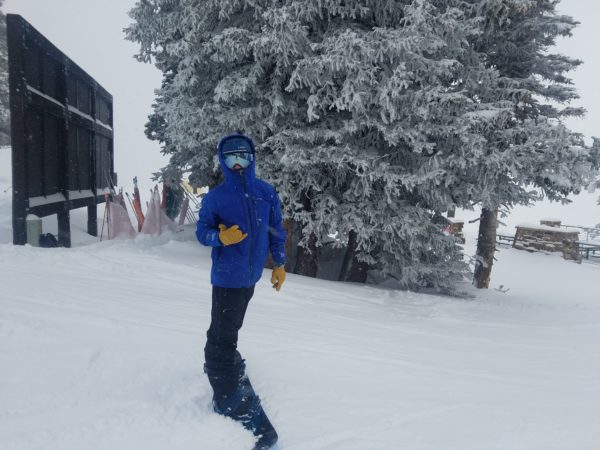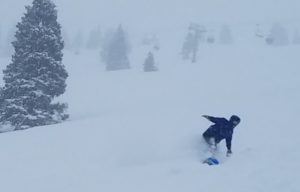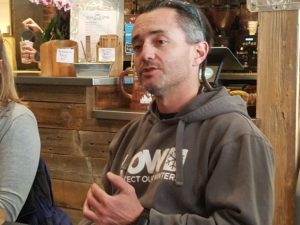Colorado outdoor industry, conservation community praise Climate Action Plan

The Colorado House late Wednesday reconciled a Senate version of the Climate Action Plan to Reduce Pollution, or HB 1261, and the bill now heads to the desk of Gov. Jared Polis for his anticipated signature.
Sponsored by Speaker of the House KC Becker, D-Boulder, the bill had the support of Vail Valley lawmakers Dylan Roberts, D-Avon, and Kerry Donovan, D-Vail, as well as many in the environmental community and outdoor recreation industry.
The bill codifies into law a 2017 executive order by former Gov. John Hickenlooper seeking to reduce greenhouse gas emissions 26 percent by 2025 and then builds on those targets.
According to its summary, “Colorado shall have statewide goals to reduce 2025 greenhouse gas emissions by at least 26%, 2030 greenhouse gas emissions by at least 50%, and 2050 greenhouse gas emissions by at least 90% of the levels of greenhouse gas emissions that existed in 2005.”
“We can address climate change, create clean energy jobs, reduce carbon pollution and help our economy all at once,” Becker said in a press release. “I thank my colleagues for taking action to address this challenge and we look forward to the governor signing it into law.
“Air pollution doesn’t respect county or governmental boundaries and in Colorado we take pride in the fact that we are doing our part to address the impacts of climate change. This bill sets goals to reduce carbon pollution and some utilities have already set carbon-free goals,” Becker added.
The bill passed the Senate earlier in the day on an 18-16 party line vote (with one senator excused), including a yes vote from Sen. Kerry Donovan, D-Vail.

“Climate change is not an abstract global concept in my district. Hunters know animal patterns are adjusting. Skiers know the snowpack is shrinking. Ranchers know weather is shifting. River rats know rivers are changing,” Donovan told RockyMountainPost.com via a spokesman.
“My district asked the state to lead on climate change and this is an important step in that direction. Paired with my bill on collecting data, we’ll be able to intelligently move towards protecting what makes Colorado great and make informed decisions to address the impacts of climate change.”
Also on Wednesday, the House gave preliminary approval to Donovan’s data collection bill, sponsored in the House by Rep. Chris Hansen, D-Denver.
“Colorado’s way of life is being threatened by climate change and carbon pollution emissions, and we need a data driven approach to protect it. But we are falling short on reducing carbon emissions because we are not collecting adequate information. This bill will lay a strong foundation of data that we can build upon to evaluate emissions,” Hansen said.
Environmental groups praised the passage of the Climate Action Plan.
“This critical legislation lays the foundation for Colorado to take meaningful action to address climate change,” said Jon Goldin-Dubois, president of Western Resource Advocates. “Here in Colorado we see the effects of climate change every day, from more frequent and intense wildfires to severe flooding, unhealthy air quality, and prolonged drought. This legislation puts us on course to cut greenhouse gases and preserve a healthy, livable climate for ourselves and our children.”
The bill also had the support of the ski industry and numerous outdoor gear manufacturing companies in Colorado and nationwide.
Snowsports Industries America (SIA) and more than a dozen outdoor manufacturers, including industry giants like Head and local shops like Minturn’s Weston Backcountry, sent a letter to the Senate last week urging passage of the bill in the waning days of the session.
With a backlog of
bills and Republicans mandating the painstaking reading on the floor of every
word of every bill, it appeared as if the climate bill might not make it to a
vote. The regular session ends Friday.
In April, a nonprofit called Protect Our Winters – comprised of elite athletes
and supported by the outdoor recreation industry – spoke at a sustainability
conference in Vail and urged support for Colorado’s Climate Action Plan.
Here’s a story produced by RockyMountainPost.com during that conference that originally ran in the Vail Daily on April 16:
Scientists, snow riders seek cultural shift on climate change
Mario Molina was born and raised in the mile-high mountain city of Antigua, Guatemala, but it was at much higher elevations in the Andes of Ecuador where climate change really hit home for him as he witnessed rapidly receding tropical glaciers there over a five-year span in the 2000s.

On a foot-deep powder day in the Back Bowls of Vail last week, the executive director of Protect Our Winters explained on a wind-swept ride up Chair 5 that we already have the technology and financial tools to divest from fossil fuels and invest in renewable energy. What we’re lacking, he says, is the political will and a cultural shift to combat the worst effects of climate change.
“The first thing is we needed the technical solutions that are both technology and finance,” Molina said. “The second thing is we need the political will, so we need to elect politicians and press politicians to move policies forward that will get us there. But then the third leg of the stool, without one of which the whole thing topples, is we need a cultural shift.”

Molina, who holds a Masters in Geosystems Analysis from Appalachian State in North Carolina, compares climate change to drunk driving and tobacco consumption – self-destructive practices that decades ago were far more widespread and culturally acceptable in the United States.
“Those were legislative battles that were fought and won at the policy level, but they’ve endured because they also accomplished a cultural shift,” Molina said. “Where Protect Our Winters [POW] comes in, and conferences like The CampSight come in, is mobilizing that cultural shift to a broader community.”
Dubbed “an innovation and marketing unconference for outdoor industry brands, adventurous visionaries and bold storytellers,” The CampSight just wrapped up three days in Vail last week.
Former POW board member Penn Newhard of Carbondale’s Backbone Media, during a CampSight coffee breakout at Yeti’s Grind in Vail, echoed Molina’s take on climate change and the need to quickly make that cultural shift.
“Now it’s actually in the space where people take this kind of cavalier attitude like smokers used to take, like, ‘Oh yeah, I know it’s really bad for me, but it’s probably not going to immediately kill me,” said Newhard, who founded Backbone as a PR, marketing, social media and content firm for the outdoor industry. “Climate change is a PR issue, and it’s the most dominant issue.”
But it’s also a policy issue, and Molina underscores the importance of the current Colorado legislative push to mitigate against and hopefully reverse climate change impacts – the so-called Ski Town Caucus fight in the “War on Powder” documented by the Vail Daily recently.
“It’s great to see in Colorado a lot of leadership from the House with the passing of the carbon limit bill that’s now going to the Senate,” Molina said. “As residents of Colorado, those are the kinds of initiatives that we need to get behind … That’s where we need people to show up, understand what this bill is trying to accomplish, that it doesn’t come at huge cost to consumers.”
The cultural shift with climate change will come more quickly, Molina says, when it’s equated with the loss of public lands for fossil fuel extraction and the shrinking of ski seasons, river flows and recreational opportunities. That’s why POW enlists adventure sports athletes as advocates.
Backbone’s Newhard helped professional big-mountain snowboarder Jeremy Jones found Protect Our Winters in 2007, and ski racers like Olympic gold medalist and Shred gear company founder Ted Ligety support its efforts. Other alpine greats such as six-time Olympic medalist and Bomber Ski founder Bode Miller have been equally out front on climate change.
Witnesses to waning winters
But it’s pioneering big-mountain riders like Jones, Cody Townsend and the legendary Kristen Ulmer — firsthand witnesses to the dramatic impact of climate change on first and soon-to-be last descents in Alaska’s Chugach Range and other ski-film locations — that are the most passionate.
During her recent induction into the U.S. Ski and Snowboard Hall of Fame, Ulmer told a conference room full of ski executives and snow riders in Salt Lake City she only expects the industry to last another 100 years at the current rate of warming.
Scientists agree that our snowpack is changing, endangering the Colorado River and impacting the state’s ski and outdoor recreation industry. And, even during an above-average season for snowfall in Colorado this winter, the trend of warmer, wetter storms is continuing.
Jeffrey Deems, a research scientist at the Cooperative Institute for Research in Environmental Sciences at the University of Colorado Boulder, said in a phone interview last month that the instrument record shows increased rain fraction in the snowpack, shorter snow seasons and higher snow lines during certain storms.
“When we think about the impact of climate change, it isn’t just, OK, well what does our snowpack look like in 2050, but are we now a maritime or inter-mountain climate?” Deems said. “What does that transition look like? Do we get an increased frequency of maritime-like events like this recent atmospheric river event that lands on top of a cold continental Colorado snowpack?”
Colorado experienced historic avalanches in early March after a consistent snowpack was hammered by a heavy, wet southwestern flow of moisture, but Deems says it’s “dodgy” to connect one avalanche cycle to the overall and ongoing trend of climate change.
Brian Lazar, deputy director of the Colorado Avalanche Information Center, agrees.
“Those kinds of storms are not really odd events; maybe the number of them this year and just how wet and kind of juicy they’ve been is a little bit out of the normal, for sure,” Lazar said in a March phone interview. “That’s not inconsistent with predictions of a warmer climate. That warm air can kind of just hold more moisture. Colorado is typically colder and drier.”
POW athletes, for the most part, are operating on anecdotal evidence, like Ligety pointing out the rapid deterioration of the Rettenbach Glacier at the annual World Cup stop in Soelden, Austria. But Lazar, who earned a Masters in Engineering studying snow and ice mechanics in Alaska’s Chugach Range, says Colorado snowpack is definitely being impacted by climate change.
“We’re certainly observing rain creeping earlier into the season … warmer temperatures, and that stuff is observation, so it’s a little bit more than anecdotal,” Lazar said. “We know things are getting warmer for sure, and we know kind of the frequency of rain on snow events in Colorado is going up from near zero in mid-winter to now where it’s not unheard of anymore.”


Latest posts by David O. Williams (see all)
- Democratization or ruination? A deep dive on impacts of multi-resort ski passes on ski towns - February 5, 2025
- Western Rail Coalition looks to revive passenger rail service on long-dormant line connecting Colorado mountain towns - January 22, 2025
- Colorado ski town looks to dig deep, diversify energy sources as climate change threat looms - January 10, 2025

You must be logged in to post a comment Login